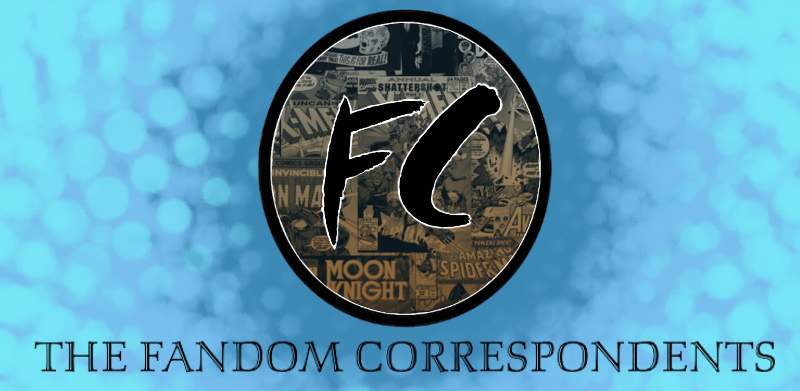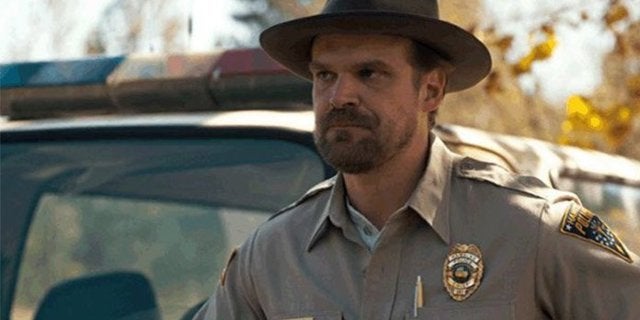This won’t really be a review for season 3 of Stranger Things, so I’ll go ahead and give you a very concise one: It’s really good and you should watch it. It’s much better than season 2 was, and it feels like it is really growing and maturing as a show while maintaining the light campiness and nostalgia drama that made season 1 so memorable. A big reason for the quality of season 3 is a character that I believe is the best-written character on television: Hawkins Chief of Police Jim Hopper.
Light season three spoilers ahead, but nothing big.
My friend WiseSage wrote a series of pieces detailing the characters of Game of Thrones, and while the last season of that show was a burning pile of subverted expectations, it definitely had some terrific characters (those whose character arcs survived the last 3 episodes at least). But the Duffer Brothers, the writers and creators of Stranger Things, have done with Jim Hopper things that few other writers have ever accomplished. Jim Hopper is a complex character that, while teetering on the edges of several different archetypes over the course of the show, follows his own unique character journey.
Let’s start with Hopper’s backstory: before the events of Stranger Things, Hopper had a wife and a daughter, the latter of whom died *presumably* of cancer or similar disease when she was very young. Hopper and his wife divorced shortly after. The importance of this backstory cannot be overstated: Jim Hopper went through one of the worst pains imaginable in this world by not only losing a child, but watching her die powerless to do anything about it. This would break any person, and understandably it breaks Hopper as we see him in season 1 balancing a huge drinking problem with his burnout as Hawkins police chief. But let’s skip to season 3 to see how the writers have really utilized his backstory in a way that elevates Hopper’s character above the rest.
Hopper is a gruff dude. He’s portrayed as no-nonsense, tough guy, punch faces first ask questions later type of person, and David Harbour plays this role masterfully. When we first see Hopper in season 3, he’s basically having an aneurysm trying to get El’s behavior with boys under control. He shouts, he threatens, he writes off Joyce’s suggestions for a calm heart-to-heart talk with his adopted daughter. The writing surrounding Hopper centers so completely on his gruff persona that it wasn’t until halfway through season 3 that I’m reminded, “Oh yeah, Hopper has a daughter that died tragically.” Hopper’s tough guy attitude is a defense mechanism for the pain he experienced in losing his daughter and the confusion of trying to raise El whom he also loves, but the writers and Harbour make it so that the defense mechanism even works for audiences. By episode 3, you start to hate Hopper and forget that he is such a pained, tragic character, and that is exactly what the character would want you to do. The Duffer Brothers have accomplished something that few modern writers have come close to: you can have a character with a tragic backstory without reminding the audience of it every five minutes. Hopper’s character is rough, but he’s never edgy. He’s strong, but he’s never infallible. And even though he’s a character motivated by love, that doesn’t mean his view of love is always impeccable or even altogether wholesome. In a world full of tropes and cliches, Jim Hopper is a nuanced character who really fuels the audience’s immersion and uses his tragedy sparingly but poignantly.
Jim Hopper’s character arc defies categorization. He definitely does not follow the hero’s journey in its purest form, but I also struggle to label him an antihero despite his tragic backstory and violent tendencies. If we are being honest, Hopper works so well as a character not because he fits some traditional literary trajectory of development but because he is a fully human character. I think about how I would act in his situation: watching a child die, losing my spouse to divorce, working for years in a job and town I couldn’t care less about, struggling to raise an abandoned child who is unlike any other child in the world and who is too quickly growing up. You know what I would probably do? I would probably be angry and shout a lot. I would probably struggle to hold it together. I would probably drink, fight, lose my temper, isolate from other people, and do all the things that Hopper does. But one thing that I hope to God I would be able to do half as well as Hopper is try. By the end of season 3, you realize that as messy and broken as Hopper was, he was trying his best to hold onto something that had brought him so much pain yet so much happiness before. This is a man who lost everything, was given more than he could handle, fought for a town that had given him nothing, and loved a lost and abused child more than anything, and he was able to convince the average viewer that he wasn’t worth their empathy.
Stranger Things has reached the point in every show’s lifespan where the plot does not hold as much allure as it once did. We get it, weird dangerous stuff comes out of the Upside-Down, El has powers to stop it, Winona Ryder worries a lot, Steve has good hair and an even better maternal instinct. But the thing that keeps people invested is the characters. In a show full of wonderful characters and relationships, sitting there in the background with a watchful eye and slowly mending heart, is Police Chief Jim Hopper. I don’t know if season 4 of Stranger Things will happen, and if it does, what the future holds for Hopper’s character. But whether the show continues or ends, Jim Hopper has shown us what kind of stories can be told when writers stop trying to impress us and start to embrace the fact that stories are at their best when they’re about all of us.



